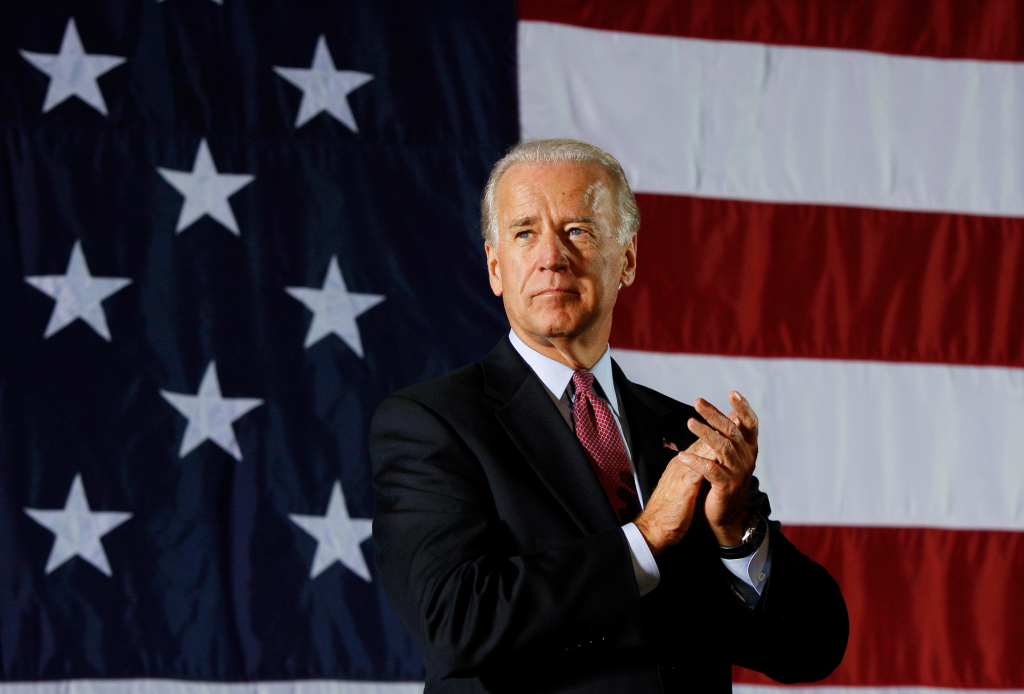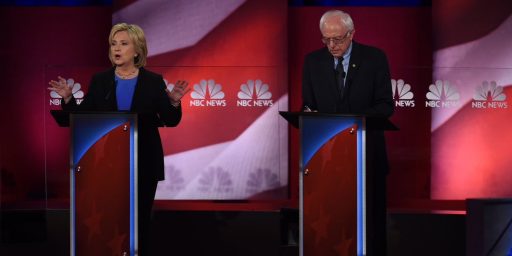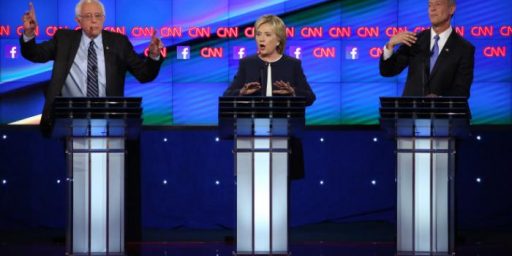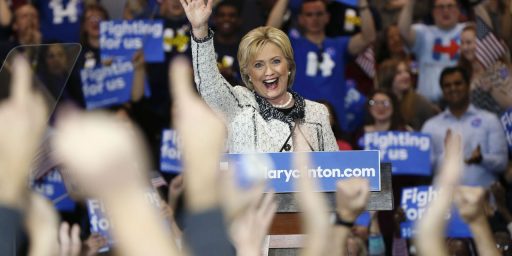Some Democrats Still Upset About Biden’s Vote In Favor Of Iraq War AUMF
A new poll indicates that at least some Democrats continue to hold Biden's 2002 vote in favor of the Iraq War.

Later this year, we’ll hit the seventeenth anniversary of the bipartisan passage in both the House and the Senate of the Authorization for Use of Military Force (AUMF) to authorize the Bush Administration to go to war against Saddam Hussein’s regime in Iraq. In the time that has passed several of the Democrats who voted in favor of that resolution have found that it posed a political problem for them in bids for re-election or higher office and now a new poll from Politico and Morning Consult shows that there is still some segment of the Democratic Party consider a vote in favor of the AUMF to be problematic, and that could post a problem for former Vice-President Biden:
Joe Biden has more foreign policy experience than any other candidate in the sprawling 22-person Democratic primary field, but his 2002 vote in favor of the invasion of Iraq is already providing fodder to his rivals — and could pose problems with younger voters.
Sen. Bernie Sanders is using the former vice president and senator’s Iraq vote to draw a contrast between their congressional records, as the Vermont lawmaker repeatedly points out that he voted against the war.
Democrats view Biden’s terms in the Senate and White House as his greatest asset, according to a new POLITICO/Morning Consult poll out Wednesday. But his vote on Iraq could cost him support, the poll showed.
Seventy-three percent of Democratic respondents said Biden’s experience in the Senate and as President Barack Obama’s No. 2 makes them more likely to back him in the primary. But nearly 3 in 10 Democrats said they were turned off by his Iraq War vote, and more than 40 percent of participants between the ages of 18 and 29 said his record on the issue made them less likely to support him.“Joe Biden’s 2002 vote in favor of authorizing military force against Iraq could hurt his support among the crucial younger voting bloc in the Democratic primary,” said Tyler Sinclair, Morning Consult’s vice president. “Notably, 42 percent of young voters 18-29 say they are less likely to support Biden because of his vote for the Iraq war, compared with 14 percent who say they are more likely and 18 percent who say his decision makes no difference at all.”
Democratic voters were more troubled by Biden’s Iraq War vote than by other controversial lines from his resume that have become campaign-trail issues, the poll found. Only 13 percent of Democratic respondents said they were less likely to support Biden because of his role in passing crime legislation in the 1990s that has come under criticism recently, and just 9 percent said his vote for trade deals such as the North American Free Trade Agreement and Trans-Pacific Partnership — frequent targets ofPresident DonaldTrump’s—made them less likely to back him.
Only his treatment of Anita Hill, who testified before Biden’s Judiciary Committee that Supreme Court Justice Clarence Thomas sexually harassed her, bothered Democratic poll participants nearly as much as the Iraq War vote—28 percent of Democrats said it made them less likely to back him.
The Biden campaign declined to comment on the poll results.
Thirty-two percent of respondents in the Morning Consult poll said the war vote makes no difference to them, and 18 percent said they don’t know whether it will influence their choice or that they have no opinion. Twenty-one percent of participants said it made them more likely to back him.
“I don’t think the vote will be the kind of flashpoint as it was in 2008 or even 2016. Democrats seem more interested in looking toward the decades ahead of us than relitigating the ones behind us,” said Jesse Lehrich, a Democratic strategist who was aforeign policy spokesman on Hillary Clinton’s 2016 campaign. He noted that it was the Obama-Biden administration that brought troops home from Iraq. “The longer Biden remains the front-runner, the more attacks on his record he’ll face,” he said. “But I would be shocked if this particular issue is the one that erodes his support.”
A former Senate Foreign Relations Committee aide with knowledge of the process said Biden voted for the Iraq resolution in hopes that President George W. Bush could engage in “tough diplomacy” through the United Nations.
“Unfortunately, that vote was misused for an unnecessary and crazily costly war,” the aide said.
Sanders has highlighted the issue, telling ABC’s “This Week” earlier this month that “Joe voted for the war in Iraq. I led the effort against it.” Sanders’ campaign declined to comment on the new poll.
Biden would not be the first Democrat who faced blowback from the electorate and fellow candidates for the position they took on the Iraq War in October 2002, roughly six months before the war began and several years before the negative consequences of the war became apparent. During the 2008 campaign for the Democratic nomination, former Senator and Democratic Presidential candidate Hillary Clinton faced similar criticism, much of it led by her chief opponent then-Senator Barack Obama. At the time, Obama pointed out that he had spoken out against the war on several occasions prior to the Senate vote and that, unlike Clinton, his opposition to the war was consistent through time. As Clinton pointed out at the time, of course, Obama was not a Senator but was instead serving in the Illinois State Legislature and didn’t really have the responsibility involved with actually voting on a resolution authorizing war. In addition in 2016, Clinton was criticized by Senator Bernie Sanders and by President Donald Trump for her vote in favor of the war. In Trump’s case, the attack was rather hypocritical given the fact that he had initially supported the war along with the majority of Americans before coincidentally turning against it about the same time that public opinion did.
Voters are free to vote for or against any candidate for any reason, of course, but I have to wonder if it makes sense to hold Biden responsible for a vote that occurred when many of the younger voters cited in this poll were either not born or not even in Elementary School. For one thing, for better or worse, Senators and Congressmen who were asked to vote on the AUMF in 2002 were under tremendous public pressure to support the Administration. It’s worth recalling that, at the time, President Bush was still immensely popular and public support for a tough position against the Hussein regime was quite high. Additionally, nearly all the available intelligence at the time pointed in the direction of the conclusion that Iraq had indeed resumed its WMD program in violation of the post-war agreements signed in the wake of the Persian Gulf War. It wasn’t until years later that we learned of the flaws in that intelligence and of the existence of intelligence that suggested otherwise. Given that, it’s not surprising that a majority of Democratic Senators, including not just Clinton and Biden but liberal stalwarts such as Tom Daschle, Chris Dodd, John Edwards, Chris Dodd, Dianne Feinstein, Tom Harkin, John Kerry, Harry Reid, Chuck Schumer, and Bob Torricelli all voted in favor of the resolution. None of this is to divert attention from the fact that the Iraq War is without question the biggest geopolitical and military mistake the United States has made in the 21st Century, and arguably one of the worst such decisions in American history, but it is to argue that we perhaps ought to have some perspective as we look at how Senators and others acted with the information that they had at the time. And I say that as someone who generally opposed the war from the start to the point where I was unwilling to support it even if the intelligence about Iraq’s WMD program was correct.
As a percentage of the overall Democratic electorate, the group of people that seem to feel the strongest about this issue is relatively small of course, so it’s unclear that these numbers are going to have that much of an impact on Biden’s candidacy. Additionally, it’s clear that the people inclined to continue to hold a seventeen-year-old vote against the former Senator and Vice-President are also people who are not inclined to support him at this stage of a Democratic Party. Instead, they are likely to support candidates like Sanders and others. As we’ve seen from the polling at the national level, as well as in early primary states such as Iowa, New Hampshire, and South Carolina, Biden not only continues to lead his fellow Democrats but does so at levels that rival what we saw in 2016 with the Clinton campaign. While a good deal of that is due to name recognition and will probably fade somewhat in the near future, it is, arguably, a sign that Democratic voters as a whole don’t care quite as much about events nearly a generation in the past in a world far different from the one we live in today.






I am not a Biden supporter. However, Biden has been around a long time, has done a lot of things, some in retrospect were good things, some were not. It is lazy thinking to contrast a long record to a short one like, say, Cory Booker’s or Pete Buttigieg’s. A candidate who has done nothing will have made no mistakes; a candidate who has been in the battle will have made mistakes.
This is part of the current call-out culture of judging people by their errors while giving no weight at all to their accomplishments. It’s a type of thinking that favors a political virginity: he who has never had sex has never had bad sex. It’s a preference for the green recruit over the experienced sergeant, and it is superficial, naive and unhelpful.
@michael reynolds:
It also serves as a disincentive for politicians to take controversial positions for fear they will be used against them in perpetuity.
These are, Trump not withstanding, unforgiving times.
Biden has a 30 year record, and people are pointing out that at critical action and decision points – Anita Hill, Iraq War – Biden went with the flow so to speak, he made the easy decision.
Everyone fights the last war, even politicians.
Looking back at 1990-1991, several Democratic senators voted against the Gulf War. This damaged their chances for the 92 primary, hence Bill Clinton (if we may oversimplify).
Eleven years later, such memories were fresh. A new primary and general election loomed in 2004, and the national mood after 9/11 favored a most aggressive foreign policy. Therefore most Democrats in Congress voted for a new war.
From the lofty moral heights of hindsight, this was clearly a mistake. But the thing about hindsight, is that it makes it hard to remember that people cannot accurately predict the future. The war in Afghanistan, another regime change adventure, hadn’t degenerated into a quagmire just yet, nor did it look poised to continue for years and years. Striking at Iraq looked like a good bet, if not quite a good idea.
@Doug Mataconis: As al Ameda has pointed out, Biden’s decision to go along with the Bush fraud leading us to war was not a controversial decision in the sense that its immediate impact was to avoid being criticized as “unpatriotic” by the neocons. Both Biden and HRC can and should be criticized for being gutless. To Michael Reynolds: In spite of this I voted for HRC and if Biden is the Dem nominee, I will vote for him also (assuming Trump allows a vote).
If you remember the politics at the time…the Bush Cabal played it almost perfectly, and no one really had much choice on the AUMF vote.
More importantly…
Congress needs to make very clear to the Dennison Cabal that the AUMF does not apply to Iran. Dennison is doing everything he can to sucker Iran into an unecessary shooting war…and Congress needs to re-assert it’s war-making authority. NOW.
I remember groaning when I listened to Biden defend his vote at the 2008 vp debate, using more or less the same argument that Kerry had made four years earlier and which Hillary would continue to make for years afterward: a vote to authorize the use of force is not the same as a vote to invade. It was just putting it on the table.
It’s reported that shortly after Ted Kennedy endorsed Obama’s presidential bid in early 2008, Bill Clinton angrily called him demanding an explanation. In the course of the conversation, Bill insisted that Hillary’s vote “wasn’t a vote for war.” Kennedy retorted that it was a vote for war and they all knew it. I agree.
Of course Biden and Hillary eventually–after so many years–came clean and said simply that their vote was a mistake. But neither they nor any other Democrat who voted for that resolution has ever admitted the true reason for the vote. Bush had become immensely popular in the post-9/11 period, and elected Dems were terrified of being marginalized as lefty peaceniks, which was more or less how the media at the time painted the anti-war movement.
If you think about it, it’s a recurring pattern throughout American history: Dems so scared of being painted by Republicans as “soft” on a foreign menace that it leads them to overcompensate by becoming unwisely and unthinkingly hawkish. It’s what led the US into Vietnam, and it’s also what led most Democratic Senators to follow Bush down the Iraq hole.
@Doug Mataconis: “It also serves as a disincentive for politicians to take controversial positions for fear they will be used against them in perpetuity.”
To be fair, the trouble with this particular vote was that it was NOT controversial — it was obviously wrong and was committing the country to a disastrous course of action based on a set of obvious lies (and yes, I thought this at the time as well), and senators who knew better like Biden and Hillary went along because not to do so would have allowed the Republicans to attack them for being soft on Saddam — basically the same reason LBJ kept sending boys to die in Viet Nam when he knew it was a lost cause.
Not to say that this vote should stand in for the totality of Biden’s career, or that it would necessarily be disqualifying for me — I did vote for Hillary. But let’s not pretend that voting to let Cheney and Bolton do whatever they wanted in Iraq was anything like a controversial position.
Now if Biden wants to make up for it, it’s pretty easy — say “Bolton and company used lies to get the senate to allow their administration to invade Iraq, and to my shame I went along with them. Now they are using exactly the same tactics to invade Iran — and we must not let them.”
It was a bad vote, for a terrible policy, which killed somewhere between 100,000 and 1,000,000 Iraqis, depending on estimates, and spawned the creation of ISIS, etc.
It was also not a close vote — Biden voting against wouldn’t have changed things, and it was supported by the majority of Americans, and it was the politically easiest vote to make at the time.
That leaves four possibilities for Biden’s vote:
1. He believed the bad intelligence and lies told by the Bush administration
2. He didn’t believe the lies, but wanted to invade Iraq anyway
3. He didn’t believe the lies, but didn’t take a politically harmful stand when it wouldn’t affect the outcome
4. He didn’t know what he believed, and followed the will of his constituents
It’s a reasonable question to press him on, and reasonable to judge him on it. Some of the explanations should be disqualifying — killing hundreds of thousands of people is more than an oops.
I may be more judgmental about this. I was one of the million New Yorkers who marched to oppose the war. I supported Howard Dean in 2004, largely because of his views on that war.
If I remember correctly, Biden has explained it as a mix of 1, 3 and 4, which is… fine. Not great, and he should have learned from it, but… fine.
@Kylopod:
@Gustopher:
The conventional wisdom and our political leaders turned out to be completely wrong. And the Dirty eFfing Hippies turned out to be right. Hoocoodanode. But the conventional wisdom was wrong for all the right reasons, “patriotism”, groupthink, respect for authority, being tough with other peoples’ lives. And the DFHs were right for all the wrong reasons, distrust of authority, the smell of the “intelligence”, brown lives matter, war is bad, the commander in chief was a feckless twit. So let’s forgive those who were wrong and ignore those who were right, and never learn a damn thing.
And yes, if Biden is the nominee, I’ll send him money and walk barefoot over glass to vote for him.
@gVOR08:
You may have intended that comment as sarcasm, but there are kernels of truth to it. Michael Moore’s Fahrenheit 9/11 is a perfect example of something that makes the right points for all the wrong reasons. It’s an amazingly bad critique of the Iraq War that resorts to a mix of vaguely conspiratorial allegations and generic antiwar propaganda, making it appear as though Saddam’s Iraq was some kind of paradise before US troops moved in, and focusing its critique entirely on the tragic loss of life rather than the reasons for the war. It provides almost no insight into why the invasion was a mistake. In the entire film WMDs are mentioned exactly once, in passing. As one of the most prominent and outspoken Iraq War critics at the time, Moore made the entire movement seem like kooks with nothing of substance to say.
@Kylopod: “focusing its critique entirely on the tragic loss of life rather than the reasons for the war. It provides almost no insight into why the invasion was a mistake. ”
An old peacenik like myself might mention that the tragic loss of life was, indeed, one major reason why the invasion was a mistake.
My God this country goes around screaming how terrible it was that Danerys Targaryon killed civilians in King’s Landing with her dragon and simply don’t give a single fuck about all the civilians their government murdered in Iraq.
@wr:
Then it’s a mistake ever to go to war under any circumstances. Is that what you believe?
@Kylopod: “Then it’s a mistake ever to go to war under any circumstances. Is that what you believe?”
I believe that the mass murder of innocent civilians should be avoided whenever possible, and that it is always a mistake to go to war simply to satisfy a political theory or a petulant man-baby’s whim.
But now that you mention it, which war in the last few centuries didn’t begin with a huge mistake? Hitler thought he could take over the world — mistake. The South thought the North would let them continue to impose slavery on the nation — mistake. The US thought they could bring the Soviet Union to its knees by killing peasants in Vietnam — mistake. Maybe you’ve got some example of wars that started out as wise decisions well worth the massacre of civilians.
@wr:
I agree 100%. Those are among the reasons why the Iraq War was such a catastrophe. But none of those things are inherent features of war. You know what is an inherent feature of war? Tragic loss of life. All wars lead to tragic deaths; virtually all lead to at least some civilian casualties, no matter how hard an effort is made to avoid them. That’s why opposing the Iraq War purely on the grounds that it led to tragic death is so inadequate; it amounts to saying you oppose the Iraq War because it was a war.
Are you paying attention to what you just said? You’ve just brought up one of the prime examples of just war–the decision by the Allied powers to go to war against Hitler and Japan. Far more American soldiers died fighting against the Nazis than died fighting against Saddam. The Allies also committed significant mass killings of innocent civilians (Dresden, Hiroshima/Nagasaki). Of course we didn’t actually go to war against them until we were attacked, but there’s a strong case for saying we should have, and certainly shouldn’t have stood idly by while a genocide was taking place.
Here are some far more lucid, specific reasons why the Iraq War deserved to be opposed from the start, other than the mere fact that it would cost lives as all wars do:
@wr:
A couple of days ago, I was having lunch a bit late at a restaurant and the few other customers and the waiter were making themselves feel better about life by chatting and saying that Trump was the worst President ever, and they had their reasons, and all was fine until someone noticed I was eating and being quiet. I then launched into the “George W Bush is responsible for 500,000 dead Iraqis while making us less safe, Jackson was responsible for the trail of tears, LBJ killed how many in Vietnam, and Trump has done nothing on that level, yet. He’s not good, and he’s a disaster on global warming, but he’s no George W Bush” rant. I wish I had stuck in a random insane complaint about Obama in there, maybe putting “you can keep your doctor” on the same level as half a million dead Iraqis.
They were unconvinced that number of dead innocents for no benefit to us was a good metric.
“But, Trump is a bigot and transphobic…”
I hate people.
@Kylopod:
It’s been a long time since I saw Fahrenheit 9/11, but I do recall thinking at the time that that particular RW criticism was out of line. The scenes in question showed normal street life and an Iraqi father taking his kids to a small amusement park. That’s an argument that Iraq had a civil society in which people lived and raised families, not a claim it was a paradise.
IIRC, from the book he had to retract a claim that Saudis had flown home from the US while flights were shut down. A claim he’d gotten from a mainstream newspaper. He retracted and apologized. I don’t recall anything else was proven wrong. Moore may exaggerate and cherry pick, and he’s a DFH, but he’s more reliable than, say, FOX “News”. Or the supposedly liberal MSM once they start beating the war drums. (I’m failing to remember the name of the “reporter” who stenographed Cheney into the NYT.)
@wr:
Not exactly. The US (or at least the people making the decisions) thought that allowing Vietnam to go communist would inevitably lead to a cascade of conversions of independent nations to communist vassal states of Russia and/or China. The “Domino Theory“.
It was a fairly dumb thing to believe, but it was (for the most part) sincere. And not nearly as dumb as believing that the people of Iraq would welcome US invaders as ‘liberators’.